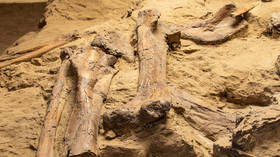Identity of India’s oldest dinosaur revealed

Present-day India was a major center of dinosaur evolution, a new study published earlier this month in the international journal Scientific Reports, has revealed. The publication, a part of the weekly journal Nature, has reported that Indian scientists discovered the remains of a dicraeosaurid sauropod from the Middle Jurassic period for the first time.
During the course of the study, which was conducted by scientists from the India Institute of Technology (IIT-Roorkee) and the Geological Survey of India (GSI) over more than five years, the oldest fossil remains of a dicraeosaurid sauropod were discovered near the Thar Desert town of Jaisalmer in the western Indian state of Rajasthan.
No remains of that type of dinosaur had previously been found in India, despite the country’s early Jurassic and Cretaceous deposits being known for their diverse sauropod fauna, the study noted.
The specimen was named ‘Tharosaurus Indicus’, referring to the Thar Desert and India as the country of origin. According the study, dicraeosaurids range in age from the Middle Jurassic to Early Cretaceous periods and have mostly been found in Africa and South America, although there have been a few occurrences in the US and China.
According to the study, the stratigraphic age of Tharosaurus Indicus could be around 167 million years, making it the earliest known diplodocoid globally. The latest discovery, seen in conjunction with the others from India, suggests the new specimen is, according to the study, “a relic of a lineage that originated in India and underwent rapid dispersal across the rest of Pangaea,” referring to Earth’s most recent supercontinent.
The fossil exploration and the excavation program that led to the discovery were initiated by the GSI in Jaisalmer in 2018, Professor Sunil Bajpai, who holds the chair in vertebrate paleontology at the department of earth sciences at IIT-Roorkee, told the Times of India newspaper.
Researchers from Delhi University had earlier found extensive hatcheries of dinosaurs in the Dhar district in the state of Madhya Pradesh in central India. During field investigations carried out between 2017 and 2020, 92 nests and 256 fossilized eggs belonging to titanosaurs, the largest dinosaurs to have ever lived, were found, according to a study published in the journal PLOS One in January 2023.
Dinosaur nests were also found in Jabalpur in eastern Madhya Pradesh and in Balasinor in the state of Gujarat, making the region one of the largest dinosaur hatcheries in the world.












